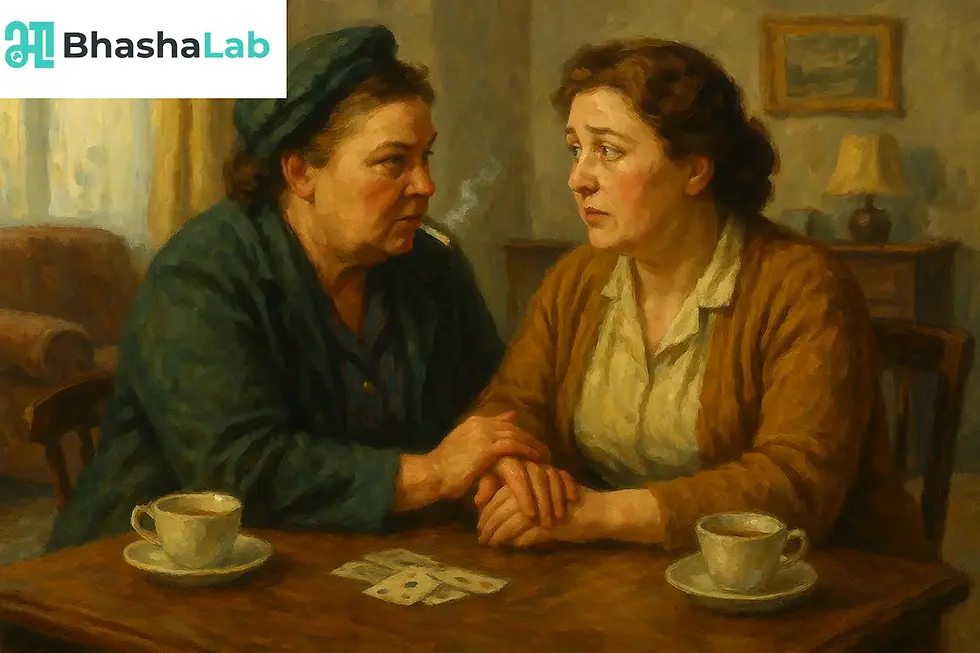2. The Address - Class 11 - Snapshots
- Jul 7, 2025
- 5 min read

Author: Marga Minco
Textbook: Snapshots
Genre: Short Story / Post-war Fiction
Summary
“The Address” is a poignant story about loss, memory, and detachment set in post-war Holland. The narrator, a young girl, returns to retrieve her mother's belongings after the war. Her mother had entrusted their valuable possessions to a woman named Mrs. Dorling during the early days of the war for safekeeping. When the narrator visits Mrs. Dorling after the war, she is first denied entry and later reluctantly allowed in by Mrs. Dorling’s daughter. While inside the house, the narrator sees familiar objects—her mother’s silverware, antique plates, and tablecloth—but they now feel foreign and disconnected. The emotional weight of these items in an unfamiliar setting makes her realise that objects lose their meaning when separated from their memories and loved ones. Feeling alienated and unable to reclaim her past, she decides not to return for them. The story powerfully conveys how war affects not only lives and relationships but also emotional connections to the past.
Character Sketch
Narrator (Unnamed Girl):
The narrator is sensitive, introspective, and emotionally mature. After the war, she tries to reconnect with her past by retrieving her mother’s belongings. However, she realises that the objects no longer carry the same emotional value without her loved ones. She reflects deeply on memory, loss, and the meaning of home. Her quiet strength lies in her decision to move forward, showing resilience and emotional growth.
Mrs. Dorling:
Mrs. Dorling is practical but emotionally cold. She took the narrator’s family belongings “for safekeeping” during the war but is unwilling to return them later. Her reluctance to even acknowledge the narrator shows selfishness and insensitivity. She represents people who take advantage of others during times of crisis.
Themes
Theme | Description |
Loss and Memory | The story reflects on how personal belongings lose emotional meaning after loss of family and home. |
Effects of War | War causes emotional, material, and relational destruction, leaving people displaced and fragmented. |
Displacement and Identity | The narrator feels like a stranger in places she once knew, highlighting the loss of personal identity. |
Detachment and Letting Go | Despite longing to reconnect, the narrator chooses emotional healing over material possession. |
Human Insensitivity | Mrs. Dorling’s selfishness reveals how people can be opportunistic even in times of collective suffering. |
✨ Literary Devices
Device | Example / Explanation |
Imagery | “The curtain moved… a musty smell emerged” — evokes sensory experiences. |
Symbolism | The address symbolises the narrator’s lost past and disconnection from it. |
Irony | Mrs. Dorling saves the items but denies access to them later — reflects betrayal. |
Foreshadowing | The opening line: “Have you come back?” hints at past trauma and loss. |
Narrative Voice | First-person narration adds emotional depth and intimacy. |
Title Justification
The title “The Address” is symbolic and central to the story. It refers to the physical location where the narrator’s mother’s belongings were kept during the war — a place once linked to hope and safekeeping. However, upon returning, the narrator finds that the address no longer holds emotional meaning. The title captures the theme of memory, emotional displacement, and the realisation that the past cannot be reclaimed through objects or locations alone. Forgetting the address becomes a metaphor for choosing emotional closure over clinging to painful memories.
One-Mark Questions
Why did the narrator visit Mrs. Dorling after the war?
She visited to recover her mother’s possessions that were left with Mrs. Dorling during the war. She wanted to reconnect with her past.
How did Mrs. Dorling behave when the narrator first visited her house?
She was cold and unwelcoming. She refused to let the narrator in and claimed she could not talk at that time.
Why didn’t the narrator recognise Mrs. Dorling at first?
She had only seen her once, briefly, years ago. She was unsure until she saw Mrs. Dorling wearing her mother’s green cardigan.
What kind of items were taken by Mrs. Dorling?
She took silverware, antique plates, cutlery, crockery, and other valuable household items. These belonged to the narrator’s mother.
What decision does the narrator take at the end of the story?
She decides not to return to Mrs. Dorling’s house. She chooses to forget the address and move on from the past.
Three-Mark Questions
Why did the narrator feel uncomfortable in Mrs. Dorling’s house during her second visit?
Although the objects were familiar, the atmosphere felt strange and impersonal. The furniture and arrangement were tasteless, and the room lacked the warmth of her childhood memories. Seeing her mother’s things in an alien setting was emotionally disturbing. The narrator felt disconnected from her past. This experience convinced her that material belongings were not enough to bring back the life she had lost.
How does the story reflect the emotional impact of war?
The story shows that war destroys not just homes and cities, but also relationships and personal histories. The narrator’s family is lost, and her connection to her past is broken. Even cherished belongings seem meaningless in new surroundings. People like Mrs. Dorling exploit the situation for personal gain. The war leaves behind deep emotional wounds and a need to let go in order to heal.
What role does memory play in the narrator’s journey?
Memory is central to the narrator’s visit. She is driven by the emotional attachment to her past and her mother’s belongings. But seeing those memories reduced to objects in someone else’s home makes her realise their emptiness. She understands that the emotional warmth associated with those things cannot be recovered. This leads to her decision to leave the past behind.
Value-Based Question
What does the story teach us about dealing with painful memories and the importance of emotional healing?
The story teaches that holding on to the past, especially one filled with loss and trauma, can cause more pain. While memories are important, we must also learn when to let go. The narrator realises that material possessions cannot restore the people or love she has lost. By choosing to forget the address, she chooses emotional healing over nostalgia. The story encourages us to honour the past but also move forward with strength and dignity.
End
About BhashaLab:
BhashaLab is a dynamic platform dedicated to the exploration and mastery of languages - operating both online and offline. Aligned with the National Education Policy (NEP) 2020 and the National Credit Framework (NCrF), we offer language education that emphasizes measurable learning outcomes and recognized, transferable credits.
We offer:
NEP alligned offline language courses for degree colleges - English, Sanskrit, Marathi and Hindi
NEP alligned offline language courses for schools - English, Sanskrit, Marathi and Hindi
Std VIII, IX and X - English and Sanskrit Curriculum Tuitions - All boards
International English Olympiad Tuitions - All classes
Basic and Advanced English Grammar - Offline and Online - Class 3 and above
English Communication Skills for working professionals, adults and students - Offline and Online
Contact: +91 86577 20901, +91 97021 12044
Mail: info@bhashalab.com
Website: www.bhashalab.com





Comments